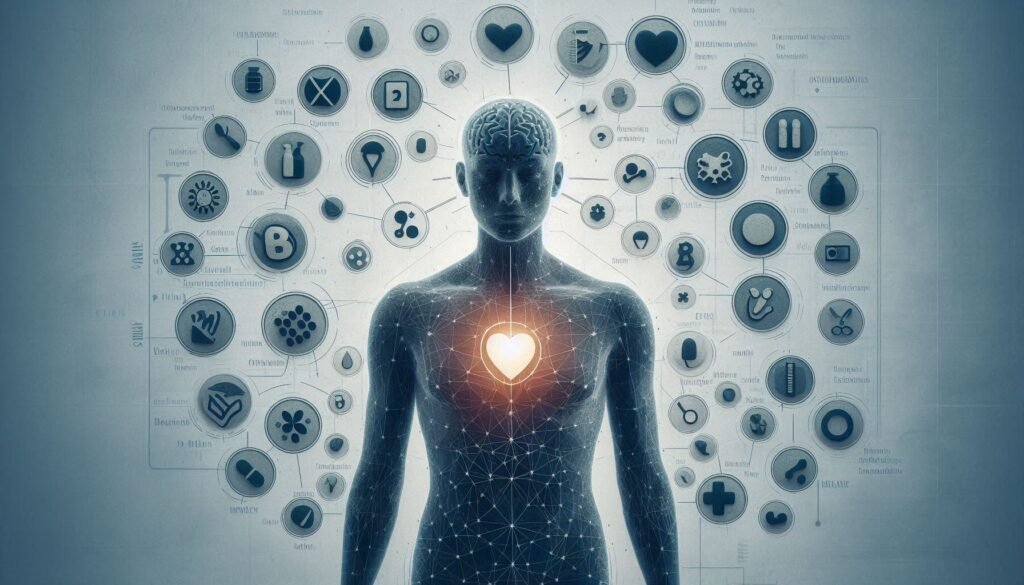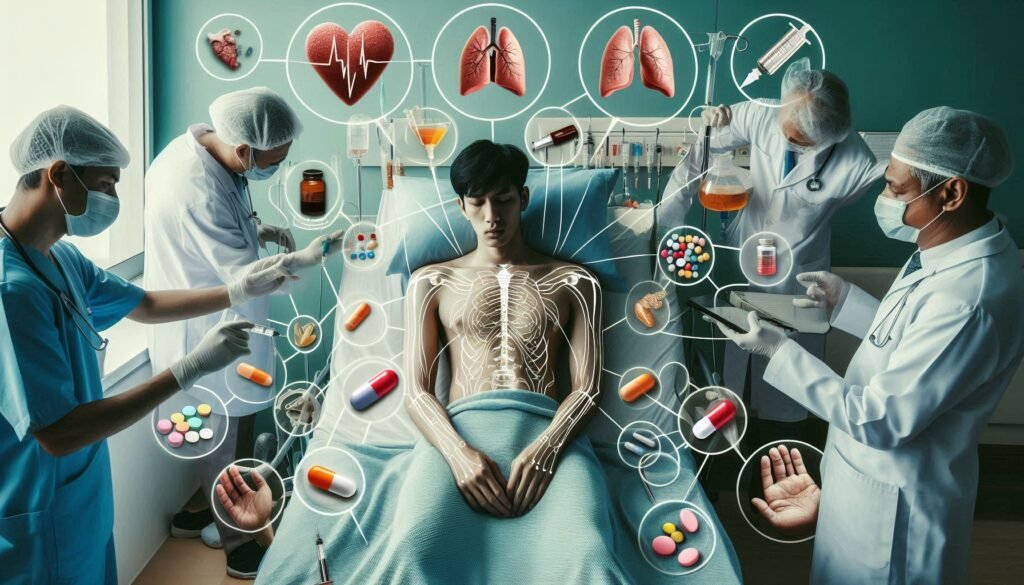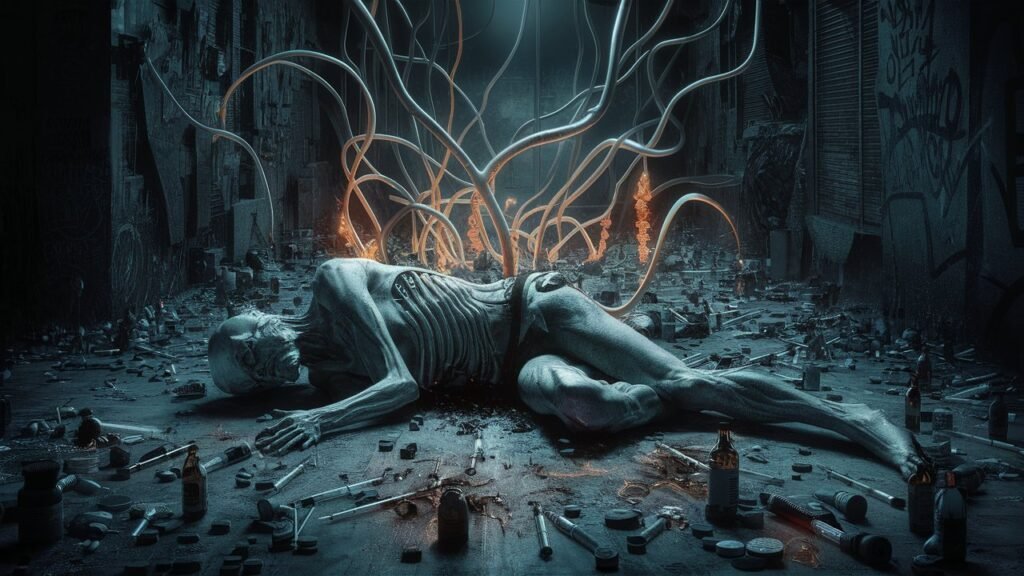Catatonia is a complex mental state that can manifest in various ways, from unresponsiveness to extreme agitation. While many factors contribute to catatonic symptoms, emerging research highlights an often-overlooked aspect: nutrition. Nutritional deficiencies associated with catatonic symptoms may provide crucial insights into this puzzling condition.
Understanding the link between nutrition and mental health is vital for both patients and healthcare providers. Deficiencies in essential vitamins and minerals can have profound effects on brain function, potentially leading to or exacerbating catatonia. By exploring these nutritional connections, we can uncover new paths for diagnosis and treatment.
In this blog post, we’ll delve deep into specific nutrients that play critical roles in maintaining optimal neurological function. Whether you’re a caregiver seeking answers or simply curious about the science of nutrition’s influence on mental health, you’ll find valuable information here. Join us as we explore how addressing nutritional gaps might pave the way toward better management of catatonia.

Overview of Nutrition’s Role in Catatonia
Nutrition plays a pivotal role in overall brain health, influencing mood, cognition, and behavior. When it comes to catatonia, inadequate nutrient intake can exacerbate or even trigger symptoms. The brain requires a steady supply of essential vitamins and minerals for optimal functioning.
Certain nutrients are vital for neurotransmitter synthesis and regulation. For example, B vitamins help convert food into energy and support the production of serotonin and dopamine—chemicals crucial for regulating mood. A deficiency in these nutrients may contribute to the onset of catatonic states.
Moreover, antioxidants found in fruits and vegetables combat oxidative stress that can impair cognitive function. This protective effect is essential as prolonged deficiencies may lead to significant neurological issues over time.
Understanding how nutrition impacts mental health opens up new avenues for treatment strategies. By addressing dietary deficiencies early on, practitioners might enhance recovery prospects for individuals experiencing catatonia-related symptoms.
Vitamin B12 Deficiency and Catatonic States
Vitamin B12 plays a critical role in neurological function and mental health. A deficiency can lead to several psychiatric symptoms, including catatonia. As the brain struggles to maintain its chemical balance, individuals may exhibit abnormal motor behavior or unresponsiveness.
Research indicates that low levels of B12 are linked to various mood disorders, cognitive decline, and even psychotic episodes. The impact on the nervous system can manifest as lethargy, reduced responsiveness, or immobility—hallmarks of catatonic states.
Those at risk for vitamin B12 deficiency include vegetarians, vegans, and older adults with absorption issues. Without sufficient dietary intake or proper supplementation, their chances of experiencing these severe symptoms increase considerably.
Addressing this deficiency is crucial for restoring normal functioning. Supplementation through diet or injections can have profound effects on reversing catatonic symptoms associated with low B12 levels. Identifying this link offers hope for better management strategies in affected individuals.
Folate Deficiency’s Impact on Catatonic Symptoms
Folate, also known as vitamin B9, plays a critical role in brain function and mental health. This essential nutrient is pivotal for DNA synthesis and repair, which impacts the production of neurotransmitters such as serotonin and dopamine. A deficiency can disrupt these processes, leading to significant mood changes.
Research has shown that individuals with low folate levels may experience various psychiatric symptoms. These can include depression, anxiety, and even catatonic states. The relationship between folate deficiency and the development of neurological disturbances is becoming more recognized among healthcare professionals.
Signs of folate deficiency often manifest through cognitive impairments or altered behaviors that resemble catatonia. Some patients may present with rigidity or unresponsiveness due to this lack of vital nutrients affecting their central nervous system.
Addressing folate deficiencies is crucial not only for overall health but also for managing catatonic symptoms effectively. Increasing dietary intake of leafy greens, legumes, and fortified grains can help restore proper levels in affected individuals.
Vitamin D Deficiency and Its Link to Catatonia
Vitamin D plays a crucial role in brain health, influencing mood regulation and cognitive function. Deficiency in this vitamin has been linked to various mental health disorders, including catatonia. Low levels of Vitamin D can disrupt neurotransmitter systems, potentially contributing to the onset of catatonic symptoms.
Research indicates that individuals with limited sun exposure or inadequate dietary intake are at higher risk for deficiency. This is particularly concerning given that many people spend significant time indoors or follow restrictive diets. The prevalence of low Vitamin D levels may correlate with an increase in reported cases of catatonia.
Symptoms like immobility and unresponsiveness could be exacerbated by the effects of Vitamin D deficiency on neural pathways. Addressing these deficiencies might not only improve physical health but also alleviate some psychiatric symptoms associated with catatonic states.
Therapeutic interventions often include supplementation alongside lifestyle changes aimed at increasing sunlight exposure and improving dietary habits. By focusing on nutrition, we may unlock new avenues for managing complex conditions like catatonia.
Iron Deficiency Anemia and Catatonic Presentations
Iron deficiency anemia is a common nutritional deficiency that can significantly impact mental health. When the body lacks sufficient iron, it struggles to produce hemoglobin, which carries oxygen in the blood. This reduction in oxygen delivery can lead to fatigue and weakness, symptoms that might overlap with catatonic states.
People experiencing catatonia may exhibit unusual behaviors such as immobility or lack of response to external stimuli. Research has shown that individuals with iron deficiency anemia are more likely to present these catatonic symptoms due to impaired cognitive function and reduced energy levels. The brain’s need for oxygen is crucial for maintaining normal neurotransmitter activity.
In children and adolescents, this link becomes even more concerning. Iron plays a vital role in brain development; deficiencies during formative years could result in long-term consequences on mood regulation and behavior.
Addressing iron deficiency through diet or supplementation may help alleviate some of these catatonic presentations. A thorough evaluation by healthcare professionals is essential for effective management of both conditions.
Thiamine (Vitamin B1) Deficiency in Catatonia
Thiamine, also known as Vitamin B1, plays a crucial role in brain health and function. Its deficiency can lead to serious neurological issues, including catatonic symptoms. Individuals with low thiamine levels may experience confusion, lethargy, and altered mental states that resemble catatonia.
The relationship between thiamine deficiency and catatonia is particularly evident in conditions like Wernicke’s encephalopathy. This condition can arise from chronic alcoholism or severe malnutrition. Symptoms often include ataxia, ophthalmoplegia, and confusion—features that overlap significantly with catatonic presentations.
Additionally, people who are unable to absorb nutrients properly due to gastrointestinal disorders may be more susceptible to thiamine deficiency. As a result of inadequate intake or absorption of this vital nutrient, the risk for developing significant psychiatric symptoms increases.
Restoring adequate thiamine levels through dietary changes or supplementation has shown promise in alleviating some neuropsychiatric symptoms associated with catatonia. Awareness of its importance could aid in better management strategies for affected individuals.
Niacin (Vitamin B3) Deficiency and Catatonic Risk
Niacin, also known as Vitamin B3, plays a crucial role in maintaining mental health. A deficiency can lead to various neurological symptoms, including those resembling catatonia. As this vitamin is essential for energy metabolism and neurotransmitter synthesis, its absence can significantly disrupt brain function.
Individuals with severe niacin deficiency may experience altered mood and cognitive impairments. These changes can manifest as withdrawal or immobility—key characteristics often associated with catatonic states. The risk heightens when the body lacks adequate niacin over an extended period.
Additionally, research indicates that low levels of niacin are correlated with increased anxiety and depression. These conditions may exacerbate or trigger catatonic episodes in vulnerable individuals. Addressing this nutrient deficit could potentially alleviate some of these troubling symptoms.
Dietary sources rich in niacin include meat, fish, poultry, legumes, nuts, and whole grains. Incorporating these foods into daily meals is vital for supporting both physical and mental well-being while reducing the risk of related disorders.
Zinc and Other Trace Minerals in Catatonic States
Zinc plays a crucial role in brain function and overall mental health. Deficiency in this essential trace mineral can contribute to various psychiatric symptoms, including catatonia. Zinc is involved in neurotransmitter regulation and modulates the immune response, suggesting that low levels may exacerbate or trigger catatonic states.
Other trace minerals such as selenium and magnesium also have significant implications for neurological well-being. Selenium is vital for antioxidant defense mechanisms, protecting cells from oxidative stress that can impact mood and cognition. A deficiency could lead to neurodegeneration, potentially manifesting as catatonic features.
Magnesium influences serotonin production and synaptic plasticity. Insufficient magnesium levels might disrupt these processes, leading to heightened anxiety or depressive states often linked with catatonia.
Monitoring zinc and other trace minerals is essential when examining nutritional deficiencies associated with catatonic symptoms. Addressing these deficiencies can be key in managing the complex interplay between nutrition and mental health disorders effectively.
Diagnosing Nutritional Causes of Catatonia
Diagnosing nutritional causes of catatonia involves a comprehensive evaluation. Medical professionals start by assessing the patient’s medical history, including dietary habits and any existing health conditions. This background is crucial for understanding potential deficiencies.
Clinical assessments often include blood tests to measure levels of key nutrients such as vitamin B12, folate, iron, and others. These tests can help identify deficiencies that may contribute to catatonic symptoms. The results guide further investigation and treatment plans.
Additionally, healthcare providers consider psychological evaluations to rule out other mental health disorders that could mimic catatonia but have different underlying causes. A multidisciplinary approach involving nutritionists can also enhance diagnostic accuracy.
Identifying nutritional deficiencies requires attention to detail and thorough communication between the patient and their care team. Understanding these elements fosters proper management strategies tailored specifically for each individual suffering from catatonic states linked with nutrient deficits.
Nutritional Interventions in Catatonia Management
Addressing nutritional deficiencies plays a vital role in managing catatonic symptoms. A comprehensive approach involves assessing dietary habits and identifying any specific nutrient shortfalls that might contribute to these psychiatric states.
For instance, if vitamin B12 deficiency is detected, supplementation can often lead to significant improvements. Similarly, increasing folate-rich foods and ensuring adequate intake of iron can help alleviate some catatonic presentations.
Healthcare providers may recommend blood tests to monitor levels of critical nutrients like vitamin D, thiamine (B1), niacin (B3), and zinc. Tailored nutrition plans focusing on whole foods rich in these vitamins and minerals can support both physical health and mental well-being.
In addition to supplements, lifestyle changes such as incorporating regular exercise or stress reduction techniques may also enhance recovery outcomes for those experiencing catatonia related to nutritional deficits.
By recognizing the intricate connection between nutrition and mental health, individuals affected by catatonia have greater opportunities for effective management through targeted dietary interventions. Understanding these relationships empowers patients to take actionable steps toward improving their overall condition while working closely with healthcare professionals for optimal results.


